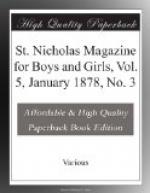For several weeks these brave fellows fought off their terrible fate, sometimes hoping, oftener despairing, and at last, one after another, they lay down far apart in the dreary solitude of the wilderness, to die of starvation.
All this and more was learned by Captain Howitt, who commanded an expedition of search sent out from Melbourne, some nine months after the departure of Burke and his company, not a word of news having been received concerning them, and many fears being felt for the safety of the little band. On Howitt’s arrival at Cooper’s Creek he, too, found the word “dig,” where the four despairing men had seen it; and beneath the tree was buried, not only the paper left by Brahe, but Burke’s journal, giving the details of the journey to the coast, discoveries made, and the terrible last scenes.
At every step of Burke’s pathway new objects of interest had elicited his surprise and admiration. Not only were there fertile plains and beautiful, flower-dotted prairies, but lagoons of salt water, hills of red sand, and vast mounds that seemed to tell of a time when the region was thickly populated, though now it was all but untrod by man. A range of lofty mountains, discovered by Burke in the north, he called the Standish Mountains, and a lovely valley outspread at their foot he named the Land of Promise.
But alas! Great portions of Burke’s journey had to be made through rugged and barren regions, destitute of water, and with nothing that could serve as food for man or beast. Driven to extremities by hunger, the pioneers devoured the venomous reptiles they killed, and on one occasion Burke came near dying from the poison of a snake he had eaten. All their horses were killed for food, and all their camels but two. Perhaps these also went at a later day, for toward the last the records in the journal became short, and were written at long intervals.
Once the party was obliged to halt with poor Gray, and wait till he had breathed his last, when the three mourning survivors went on in silence without their comrade.
A letter from young Wills, addressed to his father, is dated June 29th. The words are few, but they are full of meaning.
“My death here, within a few hours, is certain, but my soul is calm,” he wrote.
The next day he died, as was supposed by the last record; though the precise time could not be known, as he had gone forth alone to make one more search for relief, and had met his solitary fate calmly, as a hero should. Howitt, after long search, found the remains of his friend stretched on the sand, and nearly covered with leaves.
The closing sentence in Burke’s journal is dated one day earlier than young Wills’s letter. It runs:
“We have gained the shores of the ocean, but we have been aband—”
It is not, of course, known why the last word was never finished. It may have been that he felt too keenly the cruelty of his companions’ desertion of him to bring himself to write the word; or perhaps the death agony overtook him before he could finish it. At any rate, it speaks a whole crushing world of reproach to those whose disregard of duty cost their noble leader’s life. It has its lessons for us all.




